MBA Alumni Tout Degree’s Value and Versatility, GMAC Survey Finds

There have long been MBA applicants who view business school as an opportunity to make a career pivot—changing industry, function or both. Indeed, according to survey results released today by the Graduate Management Admission Council (GMAC), more than half of alumni respondents currently work in an industry or job function they had no prior experience in before entering business school. Not only that, two in five alumni (39 percent) currently work in an industry they hadn’t even considered prior to starting business school.
GMAC’s 2017 Alumni Perspectives Survey Report, conducted last fall, includes responses from 15,000 graduate business alumni representing 300 business schools from around the globe. Respondents spanned three generations and graduated from a range of program types—including full-time, two-year MBA; executive MBA; one-year MBA; part-time MBA and several non-MBA business master’s programs.
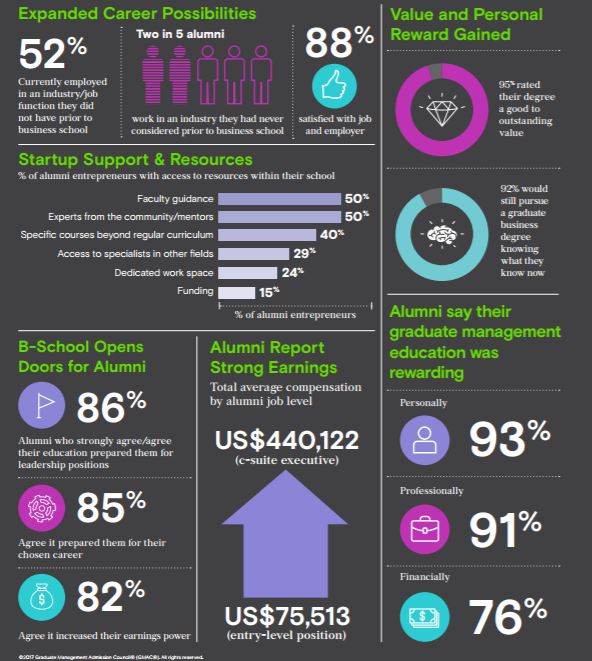
Business School Opens Doors—Including Ones You Hadn’t Considered
“In years past, we always knew that business school was a place for students to pivot from one career to another, but we had the assumption that most who did so had that intention going in,” says Gregg Schoenfeld, GMAC director of management education research. To gain a better understanding, GMAC added a new question to its most recent survey. Asked if the industry they now work in was one they considered before business school, almost 40 percent of alumni said no. “Rather, they found an opportunity in another industry after graduation and 88 percent are satisfied with their job and employer,” read the GMAC report. “Interestingly, 51 percent of alumni who are working for a nonprofit organization and 45 percent of those in manufacturing did not initially consider these sectors for postgraduate employment,” it continued.
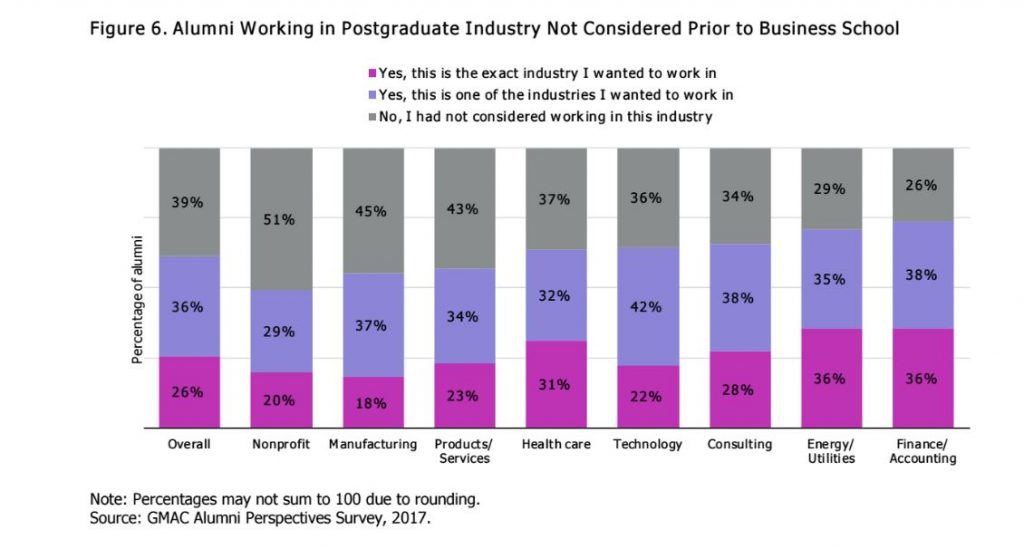
GMAC’s Schoenfeld interprets these findings as an indicator of the versatility of graduate management programs. “Not only do they help students develop knowledge, skills and abilities, but they open up new possibilities never imagined before,” he says. “Going to business school helps students discover new things about themselves and their interests, providing the networking opportunity and necessary skillset to pivot their careers.” This could prove especially valuable in times of industry disruption, he added.
Business Degrees Yield Personal, Professional, Financial Rewards
Perhaps more than anything else, this latest GMAC report suggests that alumni, regardless of graduation year or program, see graduate management education as a high-value proposition. A whopping 95 percent of alumni surveyed rate their graduate management education a good to outstanding value. Looking at graduates of two-year, full-time MBA programs, the figure is even higher—97 percent. Of those, 40 percent rated the value as outstanding, 44 percent as excellent 13 percent as good.
“What we find is that the alumni are valuing their education personally, professionally and financially and providing recommendations to their friends and colleagues,” Schoenfeld says. Indeed, 93 percent of all respondents said their degree was personally rewarding, 91 percent said it was professionally rewarding and 76 percent said it was financially rewarding. More graduates of two-year, full-time MBA programs than any other—83 percent—praised their degree’s financial impact.
Graduates of full-time, two-year MBA programs also command the greatest total compensation, according to the survey. The average total compensation package for these alumni ranges from a median of $85,870 for an entry-level position to a median of $464,516 for a C-suite executive. On average, across all degrees, alumni receive 76 percent of their total compensation in base salary. A greater percentage of compensation comes from non-salary sources—such as bonuses—as alumni move up the corporate ladder.
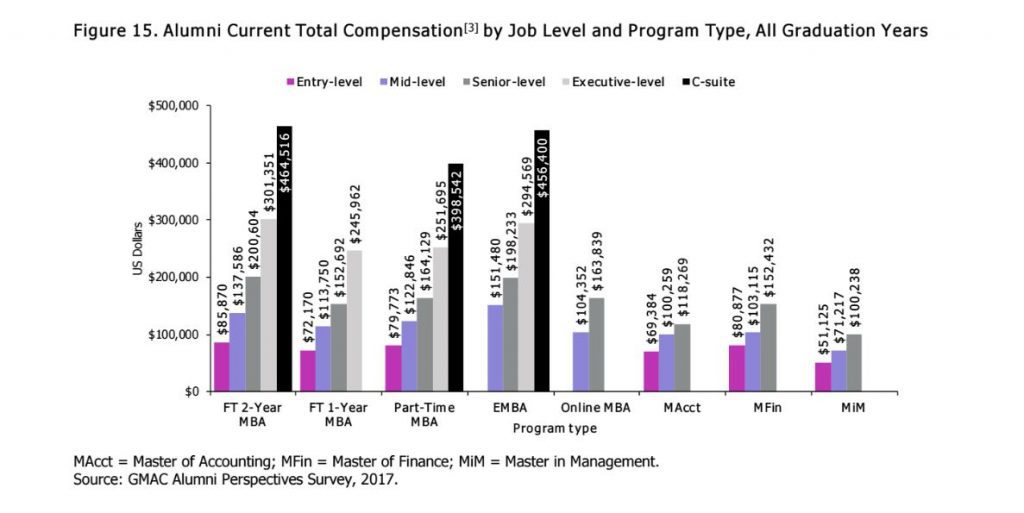
Alumni respondents overwhelmingly report that their graduate management education prepared them for leadership positions (86 percent agree/strongly agree), prepared them for their chosen career (85 percent), and increased their earning power (82 percent).
Where Have They Landed?
With regard to both industry and function, business school alumni are wide spread. Of all alumni surveyed, 27 percent work in the products and services industry, 14 percent work in technology and 11 percent work in finance and accounting. Alumni who earned MBA degrees—as opposed to non-MBA business master’s—are more likely to work in tech, nonprofits, manufacturing, healthcare, energy and utilities. Business master’s alumni, meanwhile, most often report working in the products and services, finance and accounting and consulting industries.
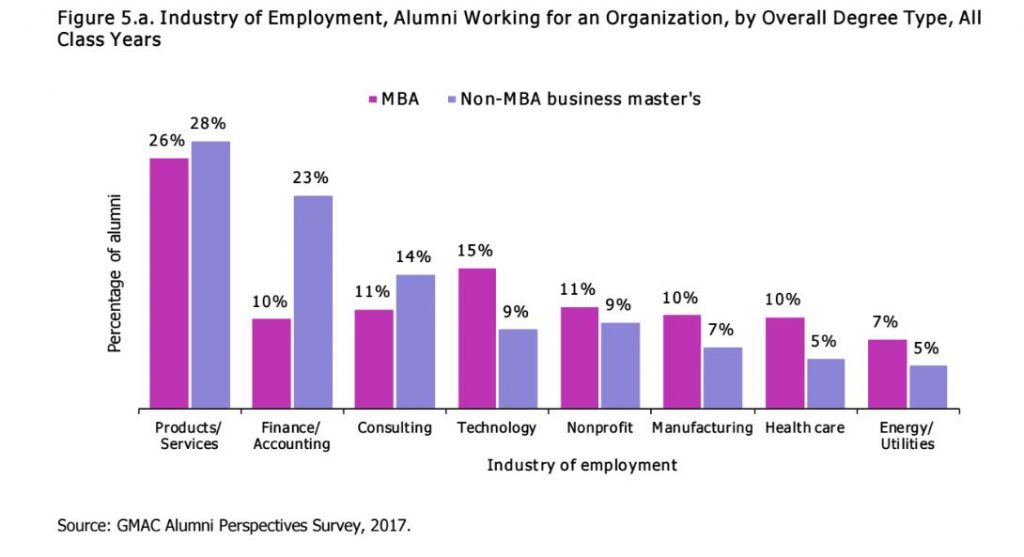
As far as function goes, here, too, more than half—52 percent—of alumni work in a different job function than they did before business school. That said, fewer alumni—26 percent—report being in job functions they had not considered prior to business school, as compared to the 39 percent who entered industries they hadn’t considered before.
All told, a third of alumni have changed both industry and function since entering business school, 29 percent are working in the same function and industry, and the remainder have either changed industries (19 percent) or job functions (19 percent).
Programs Support Entrepreneurial Students
Just as it added new questions to better understand alumni career changers, GMAC also sought with this most recent survey to gain more insight into alumni entrepreneurs. Of this year’s respondents, more than 1,500—or roughly 11 percent—are entrepreneurs. But of these, the majority—65 percent—only launched their own ventures after working for another company after graduation. “It seems like students are aware of the value of gaining some more experience before starting their own business,” Schoenfeld says. “They think, ‘Now that I have learned all these things in business school, let me put some of them into practice working for someone else first.’”
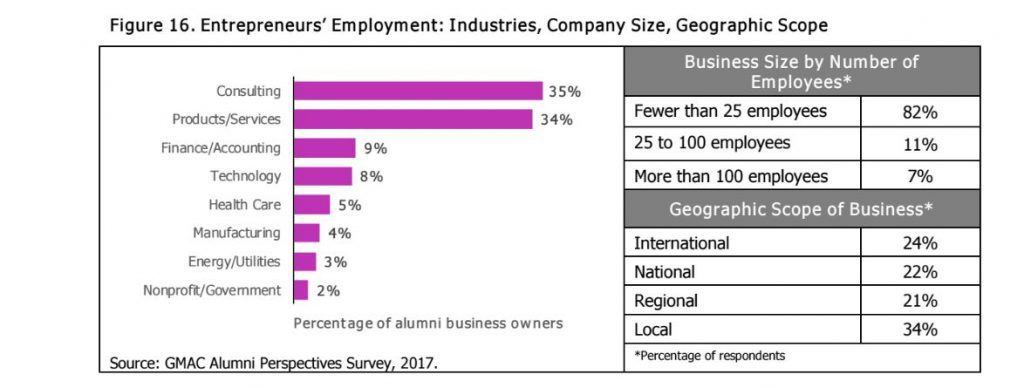
Some of the other findings specific to alumni entrepreneurs:
- They typically own businesses in the consulting and products and services industries that employ fewer than 25 people.
- Approximately 12 percent sought venture capital for their business; 72 percent of those who sought VC received it.
- Roughly one in eight (12 percent) partnered with a classmate to start a business.
- Fifty percent reported having access to faculty guidance within their school, and another 50 percent had access to mentors or community experts.
Alumni Loyalty Runs Deep
To understand how likely alumni were to recommend their programs to others, GMAC used a customer loyalty metric called Net Promoter Score (NPS). Overall, alumni gave their business schools an NPS of 47—which is higher than the average NPS for most industry sectors, according to Satmetrix, which co-developed the metric. Though positive for all graduate business programs, NPS varied according to program type, ranging from 22 for Master in Management programs to 62 for full-time, two-year MBA programs. Overall, 92 percent of alumni surveyed say that if given the choice they would again pursue their degree knowing what they now know.
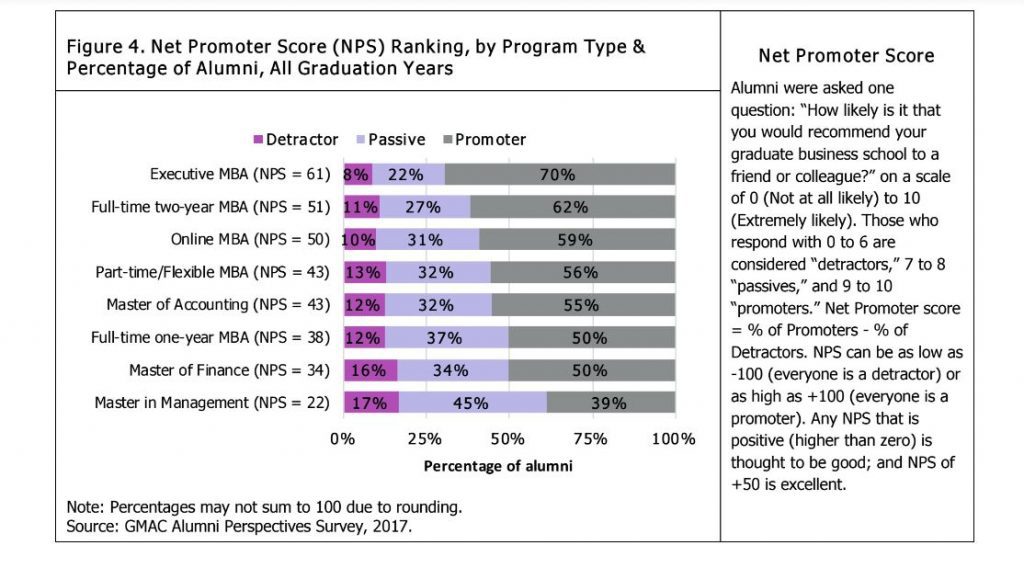
“It’s clear from the results that alumni feel their education helped prepare them for leadership positions, as well as enhanced their earnings potential and guided their career development,” GMAC President and CEO Sangeet Chowfla said in a statement. “This positivity is reflected in their recommendation of a graduate management education to others.”
Click here to view the complete GMAC 2017 Alumni Perspectives Survey Report.
This article has been edited and republished with permissions from Clear Admit.
